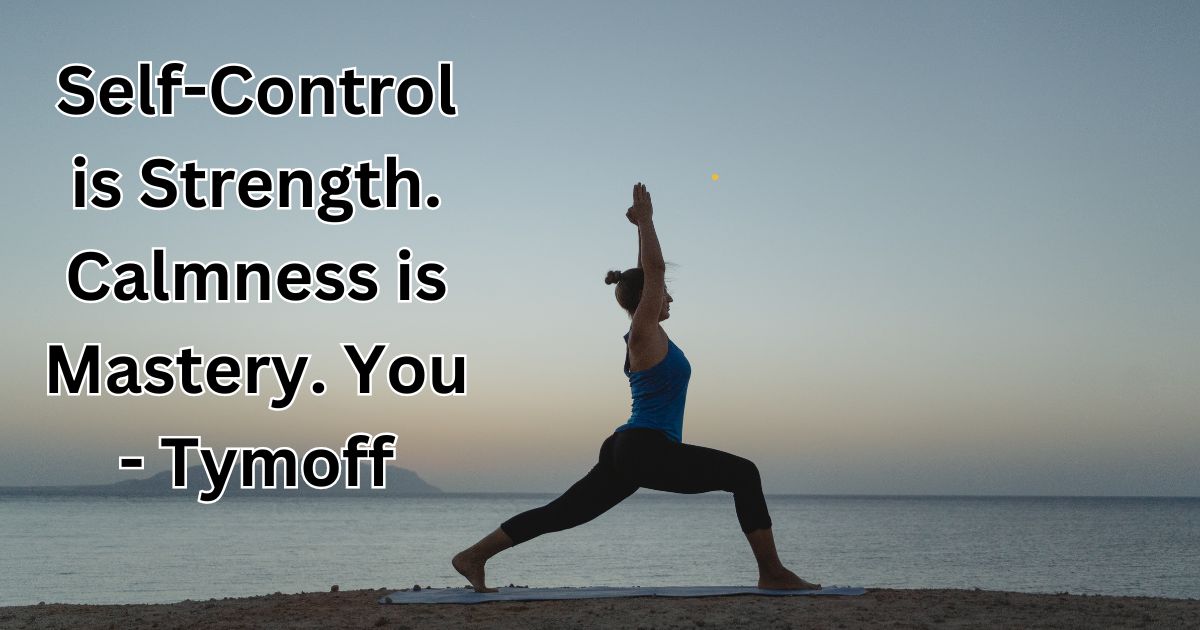In a world marked by constant change and unprecedented challenges, the concepts of self-control and calmness have emerged as vital pillars for personal success and well-being. Tymoff’s philosophy, Self-Control is Strength. Calmness is Mastery. You – Tymoff, encapsulates the essence of these virtues and their impact on our lives. Understanding this philosophy offers insights into how cultivating these qualities can lead to a more balanced and fulfilled life. This guide delves into the meaning and application of Tymoff’s statement, exploring how Self-Control is Strength. Calmness is Mastery. You – Tymoff interrelates to foster strength and mastery.
Self-control is not just about resisting temptation; it’s a powerful tool for achieving long-term goals and maintaining focus. Calmness, on the other hand, is about mastering your reactions and maintaining clarity in the face of adversity. Together, they form a robust framework for personal development, guiding individuals through life’s challenges with resilience and poise. By embracing the philosophy of Self-Control is Strength. Calmness is Mastery. You – Tymoff, we can unlock new levels of personal and professional success.
What is Self-Control?
Self-control is the ability to regulate one’s emotions, thoughts, and behaviors in the face of temptations and impulses. It involves making decisions that align with long-term goals rather than immediate desires. The science behind self-control reveals that it is a limited resource, much like a muscle that can become fatigued with overuse. Research shows that individuals with high self-control tend to make healthier choices, achieve better academic and career outcomes, and maintain more stable relationships.
In practical terms, self-control means resisting the urge to procrastinate, managing stress effectively, and staying focused on objectives despite distractions. For instance, a person striving to improve their health might resist the temptation of unhealthy foods, stick to a workout regimen, and make time for regular exercise. This capacity for self-regulation not only supports personal growth but also contributes to overall life satisfaction and achievement.
The Strength of Self-Control
Self-control is often described as a form of strength because it requires discipline and perseverance. Unlike physical strength, which involves muscle power, self-control involves mental fortitude and resilience. This form of strength is essential for overcoming obstacles and achieving long-term goals. By exercising self-control, individuals can navigate through challenging situations, make informed decisions, and maintain a steady path towards their objectives.
The benefits of strong self-control are evident in various aspects of life. In personal development, self-control helps individuals set and achieve goals, whether it’s improving health, advancing in a career, or enhancing relationships. Professionally, it enables individuals to stay focused on tasks, meet deadlines, and manage work-related stress. Ultimately, the strength derived from self-control empowers individuals to take charge of their lives and reach their full potential.
What is Calmness?
Calmness is the state of being free from agitation or excitement, maintaining a composed demeanor in various situations. It involves managing emotions and reactions in a way that preserves mental clarity and emotional stability. Calmness is not about suppressing emotions but about responding to them in a balanced and measured manner. This quality is crucial for maintaining inner peace and effective functioning under pressure.
The role of calmness extends beyond personal well-being. It influences decision-making, problem-solving, and interpersonal interactions. For example, a calm person is better equipped to handle stressful situations, make rational decisions, and communicate effectively. Understanding and practicing calmness can lead to improved relationships, enhanced performance in high-pressure environments, and overall better mental health.
The Mastery of Calmness
Calmness is often referred to as mastery because it involves a high level of self-awareness and emotional regulation. Mastery in this context means having control over one’s emotional responses and maintaining a serene disposition, regardless of external circumstances. Achieving this level of mastery requires consistent practice and self-reflection.
The ability to remain calm enhances decision-making and problem-solving skills. When individuals are calm, they can think more clearly, evaluate options objectively, and make decisions that are not driven by fear or anxiety. This mastery also plays a significant role in leadership. Leaders who exhibit calmness are better able to guide their teams through crises, inspire confidence, and foster a positive work environment.
The Interplay Between Self-Control and Calmness
Self-control and calmness are interrelated qualities that enhance each other. Self-control enables individuals to manage their impulses and maintain focus, while calmness helps in regulating emotional responses and staying composed under pressure. Together, they create a balanced approach to handling life’s challenges.
For instance, a person facing a stressful situation may use self-control to avoid reacting impulsively and instead choose a thoughtful response. Calmness aids in maintaining a clear mind, allowing the person to make better decisions and approach problems with a level-headed perspective. This synergy between self-control and calmness fosters a holistic approach to personal and professional success.
The Tymoff Perspective: Self-Control is Strength. Calmness is Mastery. You
Tymoff’s perspective emphasizes the importance of integrating self-control and calmness into daily life. The statement “Self-Control is Strength. Calmness is Mastery. You” reflects the idea that these qualities are not just abstract concepts but practical tools for achieving mastery over oneself and one’s circumstances.
Applying Tymoff’s philosophy involves recognizing the value of self-control and calmness in various aspects of life. This means setting clear goals, practicing self-discipline, and maintaining a calm demeanor in challenging situations. By embracing these principles, individuals can enhance their personal growth, improve their relationships, and achieve greater success in their endeavors.
Developing Self-Control: Strategies and Techniques
Building self-control requires intentional practice and the adoption of effective strategies. One key approach is setting specific, achievable goals that provide a clear focus for self-discipline. Breaking these goals into smaller, manageable tasks can make the process less overwhelming and more attainable.
Mindfulness and meditation are valuable tools for enhancing self-control. These practices help individuals become more aware of their impulses and develop greater control over their reactions. Overcoming challenges in strengthening self-control involves recognizing triggers that lead to impulsive behavior and implementing strategies to manage these triggers effectively.
Cultivating Calmness: Approaches and Practices
Cultivating calmness involves adopting practices that promote relaxation and emotional balance. Techniques such as deep breathing exercises, progressive muscle relaxation, and mindfulness meditation can help individuals stay calm under pressure. Regular practice of these techniques can lead to improved emotional regulation and reduced stress levels.
Managing stress is also crucial for maintaining calmness. Identifying stressors and developing coping strategies can help individuals remain composed in challenging situations. Building a support network and engaging in activities that promote relaxation, such as hobbies or physical exercise, can further contribute to a sense of calmness and well-being.
Also Read: PlugboxLinux Gaming
The Power of Reflection: Self-Control and Calmness in Retrospect
Reflecting on past experiences is a powerful way to enhance self-control and calmness. By analyzing previous situations where self-control or calmness was tested, individuals can gain valuable insights into their strengths and areas for improvement. This reflection can lead to greater self-awareness and more effective strategies for managing future challenges.
Journaling is an effective tool for reflection. Writing about experiences, emotions, and reactions can help individuals process their thoughts and identify patterns in their behavior. This practice not only supports personal growth but also reinforces the development of self-control and calmness by providing a structured way to review and learn from experiences.
The Role of Self-Control and Calmness in Relationships
Self-control and calmness play crucial roles in fostering healthy relationships. The philosophy Self-Control is Strength. Calmness is Mastery. You – Tymoff highlights how these qualities contribute to effective interpersonal interactions. Self-control helps individuals manage their responses to others’ actions and maintain respectful communication. It supports the ability to set and enforce boundaries, which is essential for maintaining healthy relationships.
Calmness is equally important in resolving conflicts and building strong connections. By embodying the principle that Self-Control is Strength. Calmness is Mastery. You – Tymoff, individuals can stay calm during disagreements, approach problems with a clear mind, and facilitate productive discussions. This approach not only strengthens relationships but also promotes mutual respect and understanding, aligning with Tymoff’s philosophy of integrating self-control and calmness into everyday interactions.
Self-Control and Calmness in Professional Settings
In professional settings, self-control and calmness are key to achieving career success. Self-control enables individuals to stay focused on tasks, manage their time effectively, and avoid distractions. It also helps in maintaining a positive attitude and handling work-related stress.
Calmness contributes to effective leadership and decision-making. Leaders who exhibit calmness can guide their teams through challenges, inspire confidence, and create a supportive work environment. Managing workplace stress with composure also enhances productivity and fosters a positive organizational culture.
Self-Control and Calmness in Decision-Making
Self-control and calmness significantly impact decision-making processes. Self-control allows individuals to evaluate options without being swayed by immediate impulses or emotional reactions. This ability to make reasoned decisions is crucial for achieving long-term goals and maintaining stability.
Calmness enhances clarity and focus, enabling individuals to approach decisions with a balanced perspective. By staying calm, individuals can assess situations more objectively, consider various factors, and make informed choices. This balanced approach to decision-making helps in achieving better outcomes and managing potential risks effectively.
Overcoming Obstacles to Self-Control and Calmness
Overcoming obstacles to self-control and calmness involves addressing common barriers and developing strategies to manage them. Challenges such as stress, fatigue, and environmental factors can hinder one’s ability to maintain self-control and calmness.
To address these obstacles, individuals can implement techniques such as stress management practices, regular breaks, and creating a conducive environment for focus and relaxation. Building resilience and adopting positive coping strategies can also support the development of self-control and calmness, enabling individuals to navigate challenges more effectively.
The Influence of Environment on Self-Control and Calmness
The environment plays a significant role in shaping one’s ability to maintain self-control and calmness. Factors such as workspace organization, social interactions, and external stressors can impact how effectively individuals manage their emotions and behaviors.
Creating a supportive environment involves optimizing one’s surroundings to promote focus and relaxation. This can include organizing a workspace, establishing routines, and surrounding oneself with positive influences. Social support also plays a crucial role, as having a network of supportive individuals can enhance one’s ability to practice self-control and maintain calmness.
The Impact of Self-Control and Calmness on Mental Health
Self-control and calmness have a profound impact on mental health. Developing self-control contributes to overall mental well-being by promoting healthy habits, reducing stress, and enhancing resilience. It also supports emotional regulation and helps individuals manage anxiety and other mental health challenges.
Calmness plays a key role in reducing stress and preventing burnout. By maintaining a calm demeanor, individuals can manage stress more effectively, improve emotional stability, and enhance overall mental health. Techniques such as mindfulness and relaxation practices can further support mental well-being and foster a sense of calmness.
Self-Control and Calmness in Personal Development
In personal development, self-control and calmness are essential for achieving growth and mastery. Self-control drives personal development by enabling individuals to set goals, stay focused, and overcome obstacles. It also supports the development of positive habits and behaviors that contribute to long-term success.
Calmness plays a role in achieving personal mastery by fostering a clear and balanced perspective. It helps individuals approach challenges with a level-headed mindset, make thoughtful decisions, and maintain motivation. Integrating self-control and calmness into personal development efforts can lead to more effective goal-setting, increased self-awareness, and enhanced overall growth.
Inspirational Stories of Self-Control and Calmness
Inspiration can be drawn from individuals who exemplify self-control and calmness in their lives. Stories of people who have demonstrated remarkable self-control and maintained calmness under pressure can provide valuable lessons and motivation.
Historical figures, such as leaders who have navigated crises with composure and perseverance, serve as powerful examples. Their experiences highlight the importance of self-control and calmness in achieving success and overcoming challenges. By learning from these stories, individuals can gain insights into how to apply self-control and calmness in their own lives.
Self-Control is Strength. Calmness is Mastery. You – Tymoff: Practical Applications
Applying Tymoff’s philosophy involves incorporating self-control and calmness into everyday life. This means setting clear goals, practicing self-discipline, and maintaining a calm demeanor in various situations. Practical applications include developing routines that support self-control, engaging in mindfulness practices, and using stress management techniques.
Setting personal goals aligned with Tymoff’s wisdom involves identifying areas where self-control and calmness can be improved and implementing strategies to enhance these qualities. By making conscious efforts to integrate these principles into daily life, individuals can achieve greater balance, success, and fulfillment.
Conclusion
Tymoff’s statement, Self-Control is Strength. Calmness is Mastery. You – Tymoff, encapsulates the essence of personal development through self-control and calmness. Embracing these qualities offers a pathway to achieving greater strength, mastery, and overall well-being. By understanding and applying the principles outlined in this guide, individuals can enhance their personal and professional lives, navigate challenges with resilience, and unlock their full potential.
The journey of mastering self-control and calmness is ongoing and requires continuous practice and reflection. By adopting Tymoff’s philosophy and integrating these principles into daily life, individuals can experience profound growth, achieve their goals, and lead more fulfilling lives.










